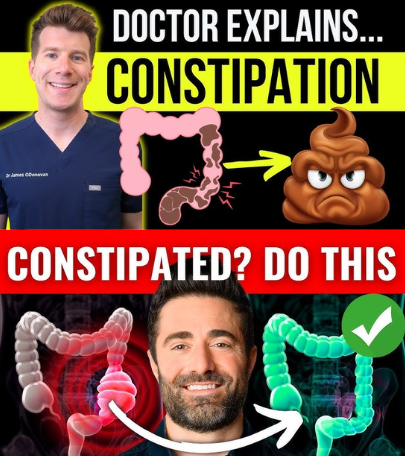
What Is Constipation?
Constipation is one of the most common digestive problems worldwide. It happens when bowel movements become infrequent or difficult to pass. While it’s normal for frequency to vary from person to person, fewer than three bowel movements a week often indicates constipation. For some, it’s a short-term issue caused by diet or stress. For others, it can become chronic, affecting comfort, mood, and overall health.
Common Causes of Constipation
Constipation doesn’t just happen—it’s usually linked to lifestyle, diet, or underlying health conditions. The most frequent triggers include:
- Low fiber intake – A diet lacking in fruits, vegetables, and whole grains.
- Dehydration – Not drinking enough fluids makes stool hard and dry.
- Lack of physical activity – A sedentary lifestyle slows down digestion.
- Ignoring the urge to go – Holding it in can make stool harder to pass later.
- Medications – Painkillers, antidepressants, and iron supplements can cause constipation.
- Medical conditions – Diabetes, thyroid disorders, or irritable bowel syndrome (IBS).
- Stress and routine changes – Travel, pregnancy, or emotional stress often disrupt bowel habits.
Think of your digestive system as a conveyor belt—if fuel, hydration, or movement is missing, the belt slows down and clogs.
Symptoms to Recognize
Constipation is more than just “not going.” It comes with other uncomfortable signs:
- Fewer than three bowel movements a week.
- Hard, dry, or lumpy stools.
- Straining during bowel movements.
- A feeling of incomplete emptying.
- Abdominal pain, bloating, or cramps.
- Occasional nausea or reduced appetite.
If these symptoms last several weeks, it may signal chronic constipation.
Video : Doctor explains CONSTIPATION | Causes, symptoms & treatment – plus when to see your own doctor!
Complications of Untreated Constipation
Ignoring constipation may lead to:
- Hemorrhoids from straining.
- Anal fissures caused by hard stools.
- Rectal prolapse (in severe, long-term cases).
- Fecal impaction, where hardened stool gets stuck.
While constipation is often minor, these complications show why it shouldn’t be ignored.
How Doctors Diagnose Constipation
Doctors usually start with questions about your diet, activity, and medical history. Tests may include:
- Physical exam – Checking the abdomen and rectum.
- Blood tests – Looking for hormonal or metabolic problems.
- Colonoscopy – To rule out blockages or other conditions.
- Imaging tests – X-rays or CT scans to see the intestines.
This helps distinguish between occasional constipation and more serious causes.
Natural Remedies for Constipation Relief
The good news is that most constipation can be improved with simple lifestyle changes.
- Increase fiber intake – Add fruits, vegetables, legumes, and whole grains.
- Stay hydrated – Drink 6–8 glasses of water daily.
- Exercise regularly – Even walking 30 minutes a day helps digestion.
- Don’t ignore the urge – Responding quickly keeps stool softer and easier to pass.
- Try natural aids – Prunes, flaxseeds, chia seeds, or warm lemon water can stimulate movement.
Think of fiber and water as lubricants—they keep the “conveyor belt” moving smoothly.
Medical Treatments for Constipation
When natural remedies aren’t enough, doctors may recommend:
- Laxatives – Stool softeners, osmotic agents, or stimulant laxatives.
- Suppositories or enemas – For more immediate relief.
- Prescription medications – For chronic cases resistant to other treatments.
- Biofeedback therapy – Helps retrain pelvic floor muscles for easier bowel movements.
It’s important to use laxatives under medical advice to avoid dependence.
Prevention: Keeping Your Digestive System Healthy
Preventing constipation is easier than treating it. Daily habits that support gut health include:
- Eating a balanced diet rich in fiber.
- Drinking enough fluids every day.
- Maintaining an active lifestyle.
- Reducing processed foods high in fat and sugar.
- Managing stress through relaxation techniques.
- Keeping a regular bathroom routine.
Prevention works like routine maintenance—it keeps everything flowing without interruptions.
When to See a Doctor
Seek medical help if constipation lasts more than three weeks, is accompanied by severe pain, blood in stool, unexplained weight loss, or sudden changes in bowel habits. These could indicate more serious digestive issues.
Video : Constipation | The GutDr Explains (3D Gut Animation)
Conclusion: A Healthier Gut for a Healthier You
Constipation may seem like a minor inconvenience, but it affects comfort, energy, and overall well-being. By understanding its causes, recognizing symptoms early, and adopting simple lifestyle changes, you can prevent or relieve it naturally. When needed, medical treatments are highly effective. Remember—healthy digestion isn’t just about avoiding discomfort, it’s about fueling your body, boosting your mood, and improving your quality of life.


